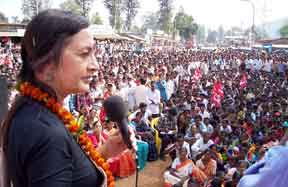 People's Democracy
People's Democracy
(Weekly
Organ of the Communist Party of India (Marxist)
No. 49
December 03, 2006
(Weekly
Organ of the Communist Party of India (Marxist)
|
Vol.
XXX
No. 49 December 03, 2006 |
‘Oppose This So-Called Development’
Brinda Karat Addresses Tribal Rally In Araku

ADDRESSING a huge public meeting in Araku tribal area of Vishakapatnam district in Andhra Pradesh, CPI(M) Polit Bureau member and MP Brinda Karat lambasted the so-called process of development by which tribals, dalits and poorer sections of people are being uprooted from their lands. She called upon these sections to rise in opposition to this sort of "development".
Thousands of tribals attended the meeting held on November 6 in an area where the Andhra Pradesh state government is proposing to hand over large tracts of land to a private company, Jindal, for bauxite mining. Around 254 villages will be affected either directly or indirectly by this project, thereby displacing thousands of tribals from their lands. Brinda Karat termed the effort of the state government as blatantly anti-tribal. Even the environment will be polluted. Moreover, according to the Panchayats Extension to Scheduled Areas (PESA) Act, not even a single cent of tribal land can be leased out without acceptance from the gram sabhas, she pointed out.
Brinda Karat reiterated CPI(M)’s resolve to oppose the bauxite mining “tooth and nail”. She criticised the government for not coming forward to give pattas to the tribals who were cultivating these lands for generations together but willing to lease out these lands for private companies. “This is nothing but killing of tribals and our Party will stand by the tribals in their struggle for survival”.
She referred to the brutal killing of agitating tribals in Kalinganagar, Orissa by the police as also repression in Chattisgarh. “Does development mean killing of peasants and tribals, and forcing them out of their long-cultivated lands?” she questioned. The tribals attending the meeting responded with a resounding “No”. In the end she interacted with the tribal women at Chittangondi village where the Jindal company wanted to do miningand participated in their programme, Dhimsa.
WATER SCHEME INAUGURATED
Brinda Karat inaugurated a ‘Gravitation water scheme’ at village Doraguda. This was constructed by ‘D Sarada Trust’ –– a trust formed in the name of late CITU activist, Comrade D Sarada. The trust undertook this project in order to provide potable drinking water to tribals and the project was constructed with the help of Navayuga Engineering firm, which laid a 3-km long pipeline through difficult terrain, has come as a big relief to the local tribals. They are presently consuming water directly from faraway springs and are thus frequently suffering from infectious diseases.
Addressing the gathering, Brinda Karat assured the tribals that the CPI(M) would always be with them and fight for their rights. She also said that man is reaching moon but the poor tribals on the land are not even getting sufficient water to drink. The fruits of science and technology must reach the poor, she said.
Brinda Karat trekked long distances to meet the tribals who welcomed her into their villages with traditional garlands and by performing “Dhimsa” tribal dance.
INSPIRING GANGAVARAM AGITATION
Addressing a seminar on “Fisherwomen and their Problems”, Brinda Karat congratulated the villagers of the tiny hamlet, Gangavaram, a seashore village near Visakhapatnam for their heroic fight against their forcible displacement. The state government is bulldozing thousands of fishermen and fisherwomen from their homelands in order to facilitate a private port project at Gangavaram. Their lands are being acquired by paying very little or no compensation at all. No relief and rehabilitation effort was undertaken. (See People’s Democracy issue dated March 27, 2006 for details about Gangavaram agitation)
Brinda Karat observed that the heroic agitation of Gangavaram fisherfolk is an inspiration to the displaced people of all projects and SEZs throughout the country. In the name of SEZs, valuable lands are being acquired by throwing out peasants from their lands. Those who agitate are not only facing bullets (like in Gangavaram) but are being brutally repressed and put into jails. Karat condemned this undemocratic practice of most governments and demanded amending the archaic Land Acquisition Act of 1884 in tune to the present situation. She assured the fisherfolk that she would raise the issues of Gangavaram Jetty for fishermen, compensation for the loss of livelihood, equal compensation to fisherwomen etc in the parliament. (INN)